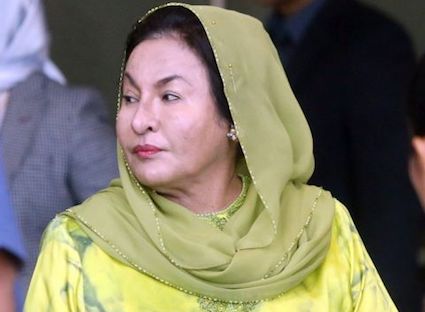EU weighs rights of people against the economy in trade deal with Malaysia

(descrier.co.uk) – The arrest of Rosmah Mansor, wife of Malaysia’s former Prime Minister Najib Razak, is undoubtedly carefully observed in Brussels. Malaysia and the European bloc initiated negotiations for the Malaysia-European Union Free Trade Agreement (MEUFTA) in 2010, but the agreement is nowhere near completion, having stalled over human rights concerns in Malaysia. With new PM Mahathir Mohamad running a tight ship, the situation is only expected to get worse in the near future.
Given that the EU claims that the defence of human rights is high on the MEUFTA negotiating agenda, Brussels faces a tricky situation: Mahathir’s human rights record is far from ideal, and the first few months of his term have indicated that the targeting of rights activists, lawyers and members of the LGBTQI community is unlikely to end on his watch. Meanwhile, the EU is keen to avoid any perceived failure to protect human rights as occurred with the FTA it concluded with Vietnam and which is set to be ratified later this year.
For the EU, closer ties with Malaysia means improving its connections with the broader ASEAN region. More than three quarters of European businesses regard the ASEAN region as the most promising worldwide. Malaysia is the EU’s second largest trading partner in ASEAN, while the EU is Malaysia’s third largest in the world. Given that bilateral trade value has gradually increased since 2006 to reach €25 billion in 2017, the lack of trade deals with the region has provoked growing frustration.
Trade cooperation between the bloc and Malaysia is currently ensured via the EU-ASEAN Dialogue, but with Brussels under pressure to finalise a deal, the EU-Malaysia Chamber of Commerce and Industry (EUMCCI) is hopeful that the new Mahathir administration offers an avenue to a fresh start to negotiations.
Yet MEUFTA has been plagued by a plethora of issues from the outset. One sticking point for Malaysia has been the EU’s palm oil ban, which Kuala Lumpur views as stemming from Brussels’ fears that Malaysian oil will come to dominate the vegetable oils market in coming years. More than 650,000 Malaysian smallholders have built their livelihoods on palm oil, and the EU is the world’s second largest buyer of the commodity. Yet now that the European Parliament has banned using palm oil as a biofuel, this stands to change from 2021 onwards.
The second issue of contention is the opening of government procurement bids to foreign companies: most government tenders require submitting firms to be owned by bumiputera, ethnic Malays or indigenous groups. Foreign tenders are typically only accepted when local resources and expertise are unavailable. A cardinal part of Malaysian economic policy since the 1970s, the bumiputera supports the Malay majority in an otherwise ethnically mixed country. To realistically gain EU support for a FTA, it will have to go.
However, the biggest elephant in the room remains the issue of human rights, the protection of which remains one of the key pillars of EU external policy objectives as prescribed by its founding treaties. Using the generalised system of preferences (GSP), the EU grants developing countries preferential access to its market, paired with “explicit human rights conditionality.” While the enforcement of this pillar is usually ad hoc in practice, it remains the cornerstone of EU-Malaysian trade negotiations. Now, the onus rests on PM Mahathir to allow negotiations to progress in that regard.
At 93-years-old, Mahathir is the world’s oldest head of government and his past record in government between 1981 and 2003 shows a man reluctant to believe in the universality of human rights. His preference for stressing the centrality of “Asian values” and using anti-Semitic slurs on multiple occasions, as well as smears against the LGBTQI community, make his government a moving target for international rights advocates.
Although the ruling coalition’s manifesto promises a number of measures to protect human rights, including a commitment to abolish oppressive laws and protecting freedom of speech, Brussels’ belief that Mahathir would change tack seem premature. Not only has the government failed to follow up on these “commitments”, but the current investigation into the 1Malaysia Development Berhad (1MDB) corruption scandal and the court case against former PM Najib Razak are fast emerging as the hallmark of Mahathir’s still fresh administration.
Plagued by transparency concerns, Najib’s trial has received particular attention for its politicised narrative. Najib has accused Mahathir of denying him a fair trial by exerting undue control over the judiciary. The claim stems from the fact that Najib’s lawyer was arrested on Mahathir’s orders, while the presiding judge was suddenly changed and two outside prosecutors assigned to lead the case against the former PM.
Mahathir’s election this year has put the EU in a difficult position and might not bode well for trade talks. Indeed, the EU must be cautious of its next steps with the Malaysian leader: the backlash over the EU-Vietnam Partnership and Cooperation Agreement (PCA) and the subsequent EU-Vietnam FTA in 2015 is still fresh in policymakers’ minds.
NGOs lamented watered-down references to human rights principles in the Vietnam deal, arguing that economic incentives took priority over the well-being of Vietnam’s population in a state where the Communist regime curtails basic liberties, clamps down on dissent on social media, and routinely imprisons opposition activists. So egregious was the EU’s perceived failure to heed its own standards that some EU policymakers called into question the stability of the FTA and described the agreement as a “dangerous precedent”.
While it is true that the Vietnam FTA still needs to be ratified by both sides, the fact that EU negotiators conceded so much ground to Hanoi is haunting the negotiations with Malaysia. If the EU is serious about long-term trade cooperation with the country, MEUFTA cannot be fast-tracked for economic benefit alone – Mahathir will also need to implement significant new human rights reforms.

